| Srl | Item |
| 1 |
ID:
112189


|
|
|
|
|
| Publication |
2012.
|
| Summary/Abstract |
The main objective of this article is to highlight the challenge of maritime security in the region geographically bounded by the Indian Ocean. It studies the current status of maritime security in the region from both the traditional and non-traditional points of view. From the traditional security perspective, it examines the strategic interests of the major Indian Ocean players-the China-India competition and India-US relations in particular-in addition to the existing maritime disputes among the littoral states. The non-traditional security angle includes sea lines of communication (SLOCs), piracy, maritime terrorism, natural disasters and other crimes with a maritime dimension. There is a convergence of interests between both the littoral and user states for charting a maritime security cooperation mechanism which envisages a sharing of responsibilities in order to achieve the short-term and long-term maritime security of the Indian Ocean.
|
|
|
|
|
|
|
|
|
|
|
|
|
|
|
|
| 2 |
ID:
112185
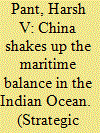

|
|
|
| 3 |
ID:
112193


|
|
|
|
|
| Publication |
2012.
|
| Summary/Abstract |
The objectives of this article are, firstly, to identify the place occupied by the Indian Ocean and South Asia in China's maritime strategy, and secondly, to identify the appropriate means of dealing with the global and regional maritime security concerns arising from China's maritime strategy as far as the Indian Ocean and South Asia are concerned. Given the fact that the South Asian states of India, Pakistan, Sri Lanka and Bangladesh, as well as China, are members of the ASEAN Regional Forum (ARF), this forum could provide a multilateral setting for dealing with the maritime concerns in China-South Asia relations.
|
|
|
|
|
|
|
|
|
|
|
|
|
|
|
|
| 4 |
ID:
112194
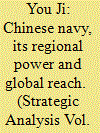

|
|
|
|
|
| Publication |
2012.
|
| Summary/Abstract |
The Chinese People's Liberation Army Navy (PLAN)'s recent accomplishments are impressive but have not gone beyond 'pocket excellence', as its overall structure and equipment are still out of date. However, the PLAN now has ships and powerful weapons that enable it to extend its combat range and engage its foes in a relatively large-scale maritime campaign beyond the Yellow Sea-its traditional battlefield. Depending on the nature of operations, it may already be able to carry out blue water missions around the first island chain in the West Pacific. Yet this article argues that due to its inherent weaknesses the PLAN has so far positioned itself as a regional navy, not a global one, in terms of its missions and capability building. On the other hand, the notion of a regional navy is open ended. As the PLAN acquires more ocean-going warships, its combat reach will incrementally expand, and its current defensive posture will acquire more teeth.
|
|
|
|
|
|
|
|
|
|
|
|
|
|
|
|
| 5 |
ID:
112195
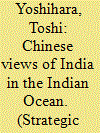

|
|
|
|
|
| Publication |
2012.
|
| Summary/Abstract |
In recent years, China's strategic community has emerged as an increasingly vocal and influential constituent of Chinese policy debates. This article focuses on Chinese analysts steeped in the realpolitik tradition. These intellectuals and strategists discern a troubling trend towards intense competition and zero-sum interactions in the Indian Ocean. In their view, a progressively assertive India will set the pace of the impending maritime rivalries among the great powers. This article argues that if such a grim forecast takes hold in Beijing, power plays already underway in the Indian Ocean will likely become more pronounced and contentious.
|
|
|
|
|
|
|
|
|
|
|
|
|
|
|
|
| 6 |
ID:
112192


|
|
|
|
|
| Publication |
2012.
|
| Summary/Abstract |
India took an unprecedented step 10 years ago by setting up a joint theatre operational command for the Andaman and Nicobar Islands (ANC). This article seeks to examine the following questions: why did India decide to establish its first joint operational command? Why has the creation of this and other unified commands been so incremental in the Indian context? What are the arguments for and against jointness, integration and joint operational commands in the Indian context? The article will firstly discuss the concept of joint operational commands and then theories of organisational military change. Secondly, it will look at the debate in India about jointness and these commands, and how this led to the creation of the ANC. Lastly, it will conclude with observations about the ANC and the future of similar commands in the Indian context. Unless disaster or political events incentivise Indian politicians to force change on the defence establishment, it is unlikely that there will be any further joint operational theatre commands (like the ANC) in the future, but joint operational functional commands (like the strategic forces command, SFC) are more likely.
|
|
|
|
|
|
|
|
|
|
|
|
|
|
|
|
| 7 |
ID:
112186
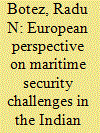

|
|
|
| 8 |
ID:
112183
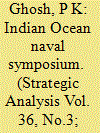

|
|
|
| 9 |
ID:
112187


|
|
|
| 10 |
ID:
112190
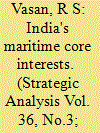

|
|
|
|
|
| Publication |
2012.
|
| Summary/Abstract |
While the maritime doctrine was published by the Indian navy in 2004 and improved upon in 2007, the core interests identified were as seen through the prism of the navy. The national maritime interests of India are distinctly different from the ones identified by the Indian navy and need to be analysed to understand the nuances and the dimensions of such interests so as to promote India's maritime power potential. The paper seeks to identify these core maritime interests and suggests a synergised approach for bringing all the stakeholders under a common umbrella to provide the necessary impetus for nation building and to provide leverages when required. Such a process would enhance India's national status as a maritime power of eminence in this century of the seas.
|
|
|
|
|
|
|
|
|
|
|
|
|
|
|
|
| 11 |
ID:
112184


|
|
|
| 12 |
ID:
112191
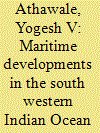

|
|
|
|
|
| Publication |
2012.
|
| Summary/Abstract |
The Indian Ocean region, being a vast geographical entity, is composed of various regional and sub-regional entities. This article addresses prominent maritime developments in the South Western Indian Ocean (SWIO) region of the Indian Ocean Rim and highlights the multi-dimensional growth of strategic maritime activities in the region. The developments, which range from security cooperation among nations to a rise in maritime piracy and regional cooperation for fisheries management, lend a distinct maritime perspective to the emerging geostrategic and economic discourse in this oceanic region of East Africa, dotted as it is with island and coastal states. The article then juxtaposes these prominent developments with the main concerns of the maritime states and their efforts to meet the challenges posed by the developments. The article also brings out the relevance of these concerns in the context of India's military maritime strategy and foreign policy goals in the region, underscoring the self-evident case for a more focused and multi-pronged engagement with the region, to harness the potential of mutually beneficial cooperation across various maritime disciplines. The likely areas of cooperation are discussed, with emphasis on the advantages that could accrue to India from these endeavours.
|
|
|
|
|
|
|
|
|
|
|
|
|
|
|
|
| 13 |
ID:
112188


|
|
|
|
|
| Publication |
2012.
|
| Summary/Abstract |
In recent years the Indian Ocean has received significant attention from the defence-intellectual community in the United States. However, the actual strategic importance of the region to US interests is less clear. In an environment of fiscal austerity, if commitments abroad are not firmly linked to interests, any significant involvement in a region of secondary concern could contribute to 'imperial overstretch'. The 'Neo-Nixon Doctrine' outlined here calibrates American interests and regional commitments by devolving primary responsibility for regional security to the major democratic powers in the Indian Ocean, whom the US would bolster with aid and advice.
|
|
|
|
|
|
|
|
|
|
|
|
|
|
|
|